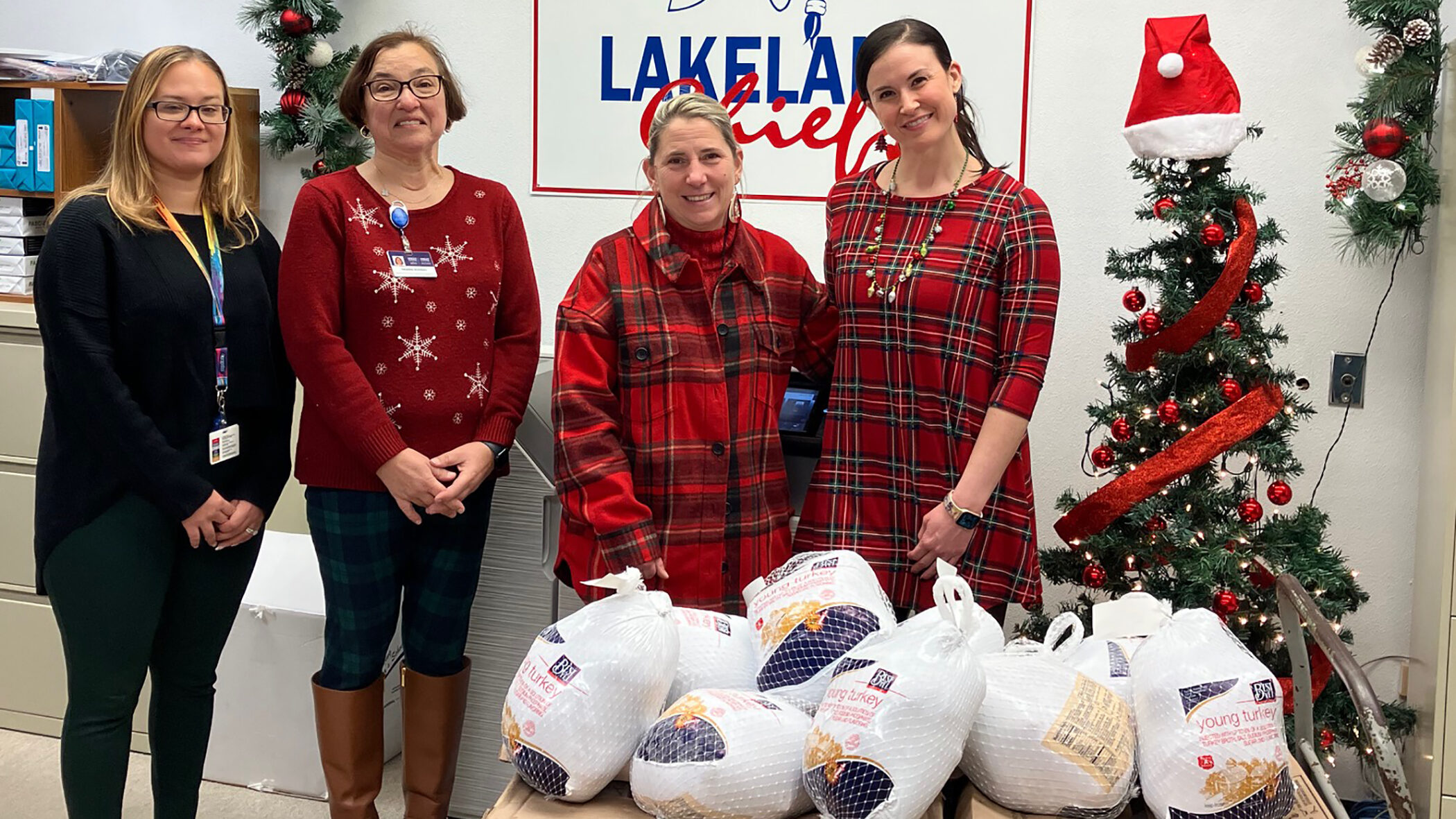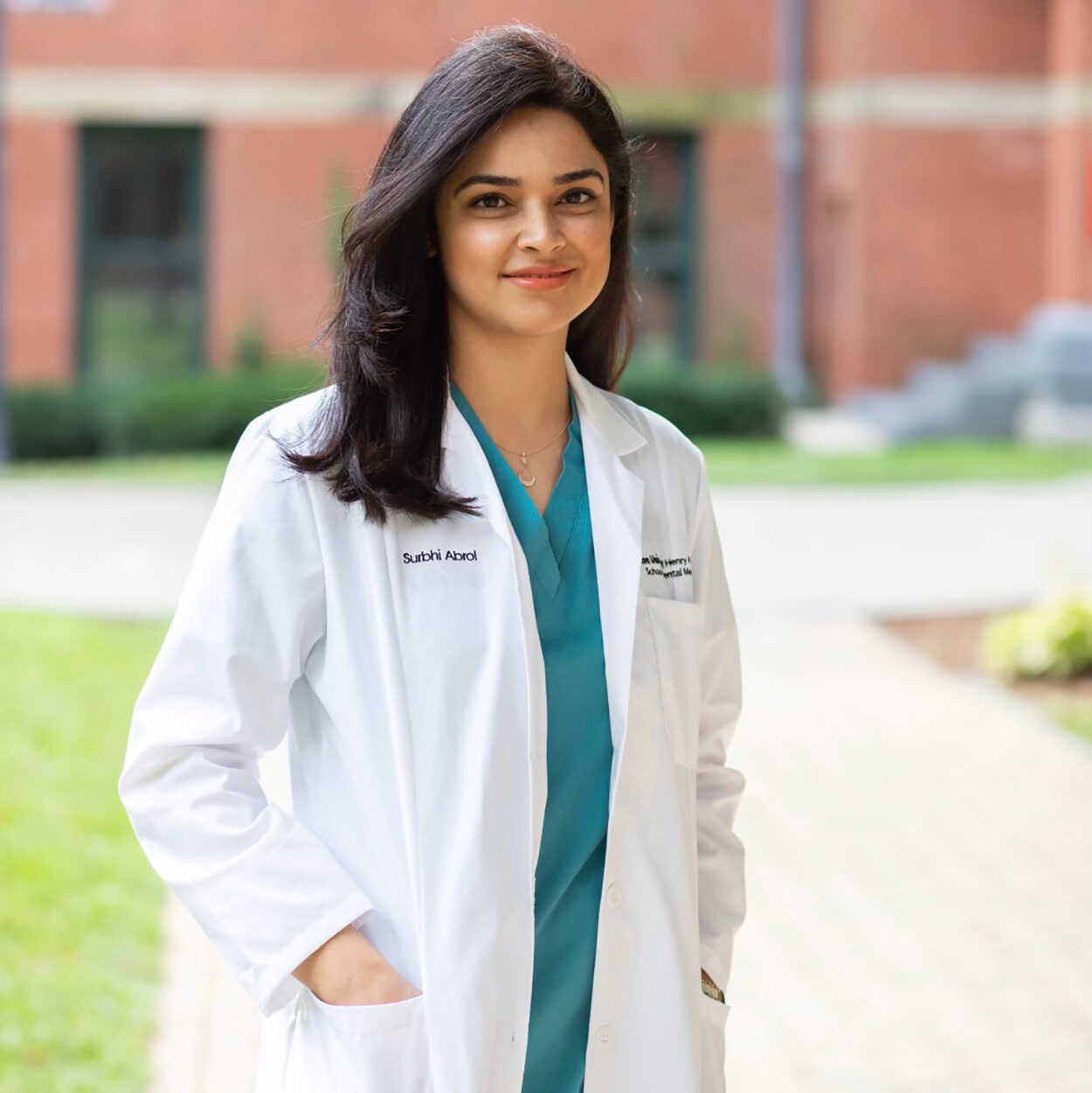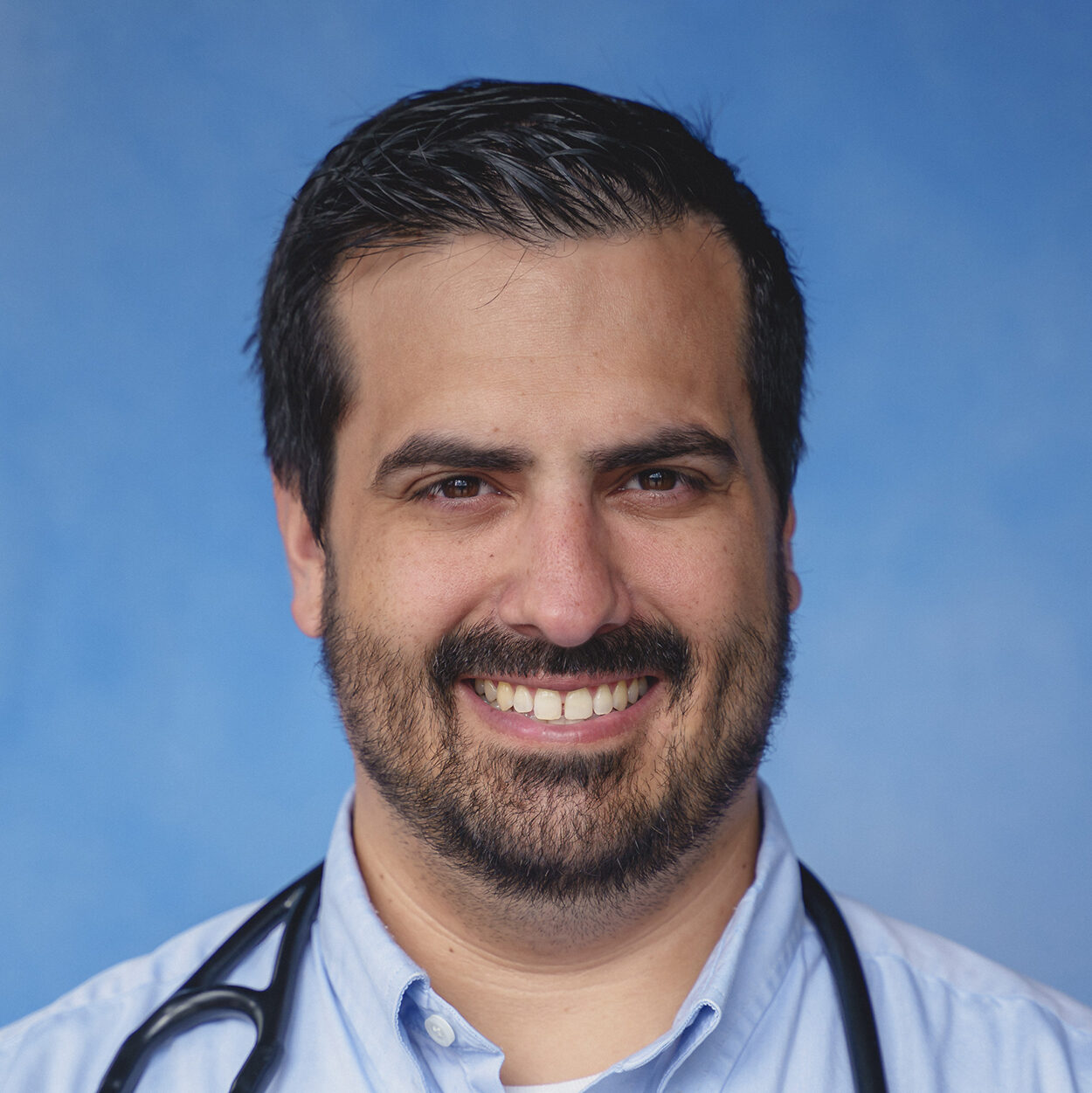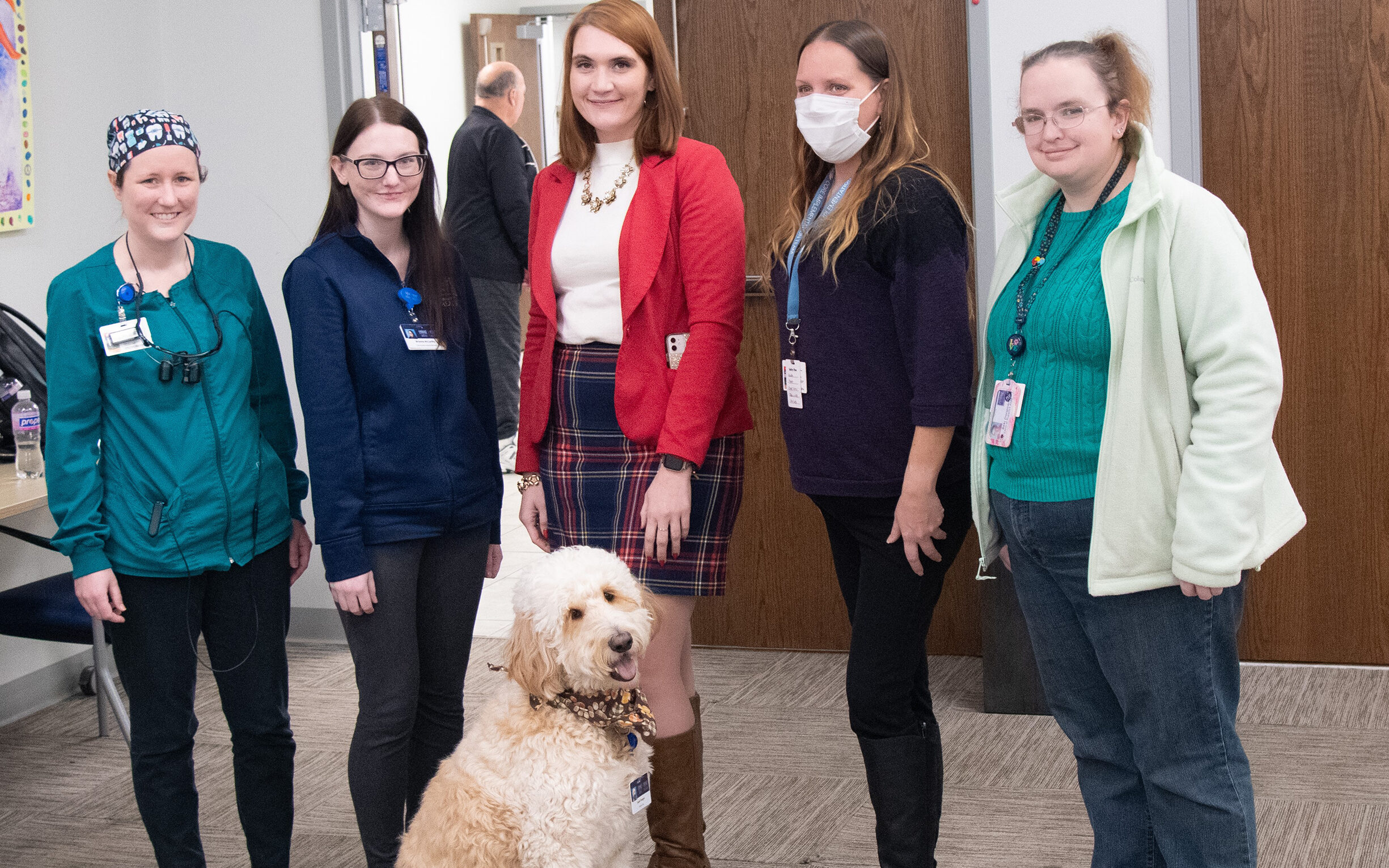
Never camera shy, therapy dog Sadie strikes a pose with employees at The Wright Center for Community Health Scranton Practice: Dr. Caitlin McCarthy, dentist; Brianna McCarthy, community health worker; Aimee Wechsler, director of government affairs; Shannon Osborne, project manager; and Rebeka Donovan, clinical support aide.
Sadie, a cute and gentle canine, offers ‘happy boost’ to busy health care professionals and support staff
To promote employee wellness, The Wright Center for Community Health recently added a new member to the team: She works like a dog and gets rewarded mainly with handfuls of Cheerios.

Sadie, a 72-pound goldendoodle certified by the Alliance of Therapy Dogs, also has her own Wright Center ID badge.
Sadie Ann Finegan, 2, is a bona fide therapy dog. She has been certified by the Alliance of Therapy Dogs and earned the American Kennel Club’s Canine Good Citizen certificate, signifying she completed a 10-skill test on good manners.
Sadie and her handler, Olyphant resident Melissa “Missie” Finegan, routinely visit each of The Wright Center’s nine primary care practices in Northeast Pennsylvania to provide employees and resident and fellow physicians with a brief workday break. For many, it seems to lift their spirits, too.
“If you watch Sadie interact with the staff, you immediately see their body language soften, you see their faces soften, you see grown men on the floor talking baby talk to an animal,” says Finegan. “I don’t know how many times we’ve heard, ‘I really needed this today.’”
The Wright Center introduced the program in November 2023 and refers to it as “animal-enabled wellness services.”
Finegan and Sadie travel monthly to the nonprofit organization’s clinics in Lackawanna, Luzerne, and Wayne counties. During each hour-long visit, employees are invited to drop by a conference room or other non-public area for a few minutes of Sadie time, dispensing gentle pats, pets, scratches, and snuggles – but no ruff-housing!
“If people need a little reprieve or a happy boost, they can take a moment away from their desks and interact with Sadie,” says Allison LaRussa, associate vice president for health humanities, trauma-informed sanctuary frameworks, and justice, equity, diversity, inclusion, and belonging at The Wright Center. “It makes you instantly feel good.”
When Sadie struts into a clinic, she often draws a crowd of admirers, many of them snapping cellphone photos like paparazzi at a Taylor Swift sighting. Fans gawk and talk. Look at her long eyelashes. Is that a new bandana she’s wearing? Oh my gosh, she has a Wright Center ID badge with her name on it!
But beneath the fuss and fun – including the distribution of dog treats – lies a serious purpose for the pooch’s presence.
The health care industry is coping with workforce challenges, including employee burnout and high turnover. The troubles intensified in hospitals and other health care settings during the COVID-19 outbreak. But they reflect a malaise impacting many modern U.S. workplaces in which people wrestle with anxiety, depression, and other behavioral health issues that can contribute to physical illness as well as poor productivity and job dissatisfaction.
The Wright Center’s leadership team has introduced a range of long- and short-term initiatives, each demonstrating its commitment to promoting employee wellness.
These efforts include ongoing participation in the Sanctuary Institute’s model for organizational change, which gives workers the tools to improve their daily interactions with colleagues and others and to create a safer, trauma-informed workplace. Employees can also access a whole-person wellness blog, mindfulness sessions, art sessions, and other support, such as Sadie’s visits.
The intent is to foster good health and resiliency among The Wright Center’s staff and the many professionals who train within its clinics, including resident and fellow physicians, physician assistants, medical assistants, and others.
“If our clinicians are not well, how do we provide the best care for our patients? We simply cannot,” explains LaRussa. “So, allowing even a few minutes during a workday for some of these wellness initiatives to help people process – or to help them relax or whatever they might need – is really beneficial.”
‘Quick fix to a bad day’
As a stress-buster, Sadie might be just what the doctor ordered. Her handler describes her as “72 pounds of teddy bear.” The goldendoodle (a cross between a golden retriever and a poodle) has floppy ears, a huge button nose, and a molasses-sweet disposition, the combination of which puts smiles on the faces of almost everyone she meets.
During her visits at The Wright Center, efforts are made to not disturb patient care or infringe on employees who have pet allergies or don’t enjoy animal encounters for other reasons. For most people, she’s a dose of joy.
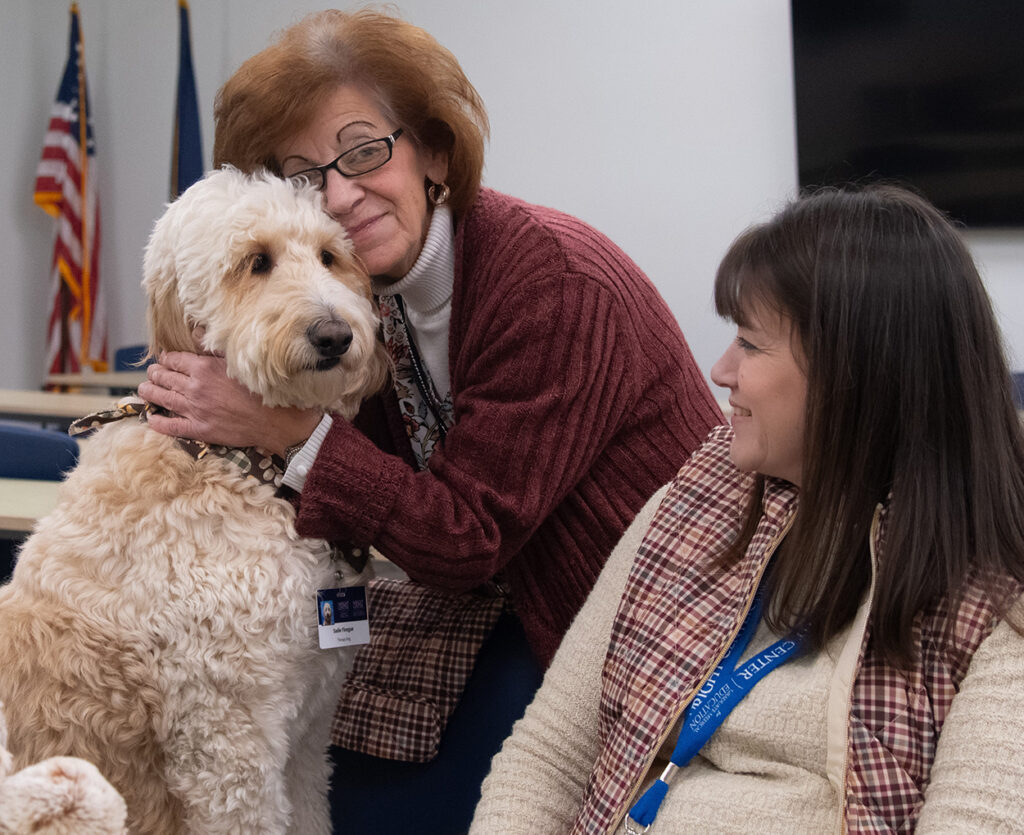
Therapy dog Sadie receives a warm squeeze from Betsy Freeman, medical office assistant at The Wright Center for Community Health Scranton Practice. Dog handler Melissa Finegan, at right, and Sadie began making regular visits to The Wright Center’s nine clinics in November as part of an initiative to promote employee wellness.
“Sadie is a quick fix to a bad day,” says Finegan. “She brings that tail-wagging, panting, unconditional love that just makes everything OK.”
Finegan, 48, is a longtime patient of Dr. Linda Thomas-Hemak, president and CEO of The Wright Centers for Community Health and Graduate Medical Education. Finegan initially asked to bring the dog to her doctor’s appointments at the Mid Valley Practice in Jermyn purely for her personal support. Later, the two women discussed possibly engaging Sadie in a bigger mission.
“It just kind of snowballed into Sadie doing staff support,” Finegan says.
Elsewhere, therapy dogs have been used on college campuses and in schools to decrease students’ stress before pressure-filled exams. Similarly, the Lehigh Valley Health Network has enlisted therapy dogs at its COVID-19 vaccine clinic to ease the minds of worried children, and the Pennsylvania Hospital in Philadelphia sometimes opens its campus doors to a therapy dog to spread positivity among staff and patients.
Beyond health care settings, therapy dogs have been spotted serving in airports. At the Wilkes-Barre/Scranton International Airport, for example, participants in the all-volunteer Therapy Animals Integrating Less Stress, or TAILS, program serve to decrease humans’ tensions while they wait for takeoff.
‘An amazing contributor’
Sadie might expand her scope of service to more places in the future, Finegan says. For now, however, the duo is focused on learning the ins and outs of The Wright Center’s primary and preventive care clinics, such as which employees will permit Sadie’s face-licking “kisses” and which prefer to keep their distance.
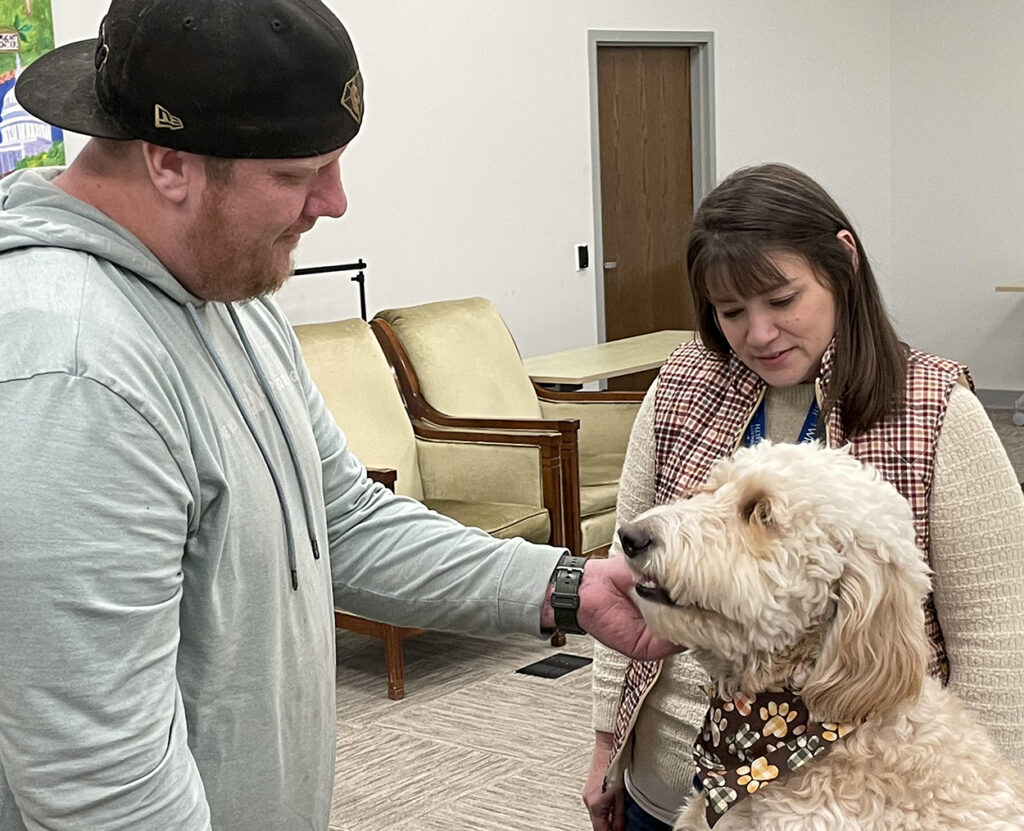
Michael Gatton, maintenance worker at The Wright Center for Community Health Scranton Practice, scratches Sadie, a therapy dog that visits the clinic for about an hour each month in tandem with Olyphant resident Melissa Finegan. Employees are invited to de-stress by spending a few minutes with Sadie as part of what’s called animal-enabled wellness services.
Sadie might expand her scope of service to more places in the future, Finegan says. For now, however, the duo is focused on learning the ins and outs of The Wright Center’s primary and preventive care clinics, such as which employees will permit Sadie’s face-licking “kisses” and which prefer to keep their distance.
Sadie is one of three dogs in the Finegan home. Around family members, she can become playful and excited. But when Finegan pulls up to a Wright Center clinic with Sadie for their contracted duties and says the word “work,” the dog knows it’s time to be calm and extra attentive.
Sadie recognizes commands such as “leave it” – to disregard a pill or other item accidentally dropped on the floor, for instance – and “place” – to remain seated in a particular spot. However, this therapy dog seemingly needs no verbal prompt to do what she does best: radiate happiness.
“Sadie is an amazing contributor to our household,” says Finegan. “We’re just grateful that she can now do that out in the world.”
For more information about The Wright Center for Community Health, call 570-230-0019 or visit TheWrightCenter.org.

